Looking at the 2019 blockchain from the industrial and commercial information: the number of registrations dropped by 20% from the previous month. Many state-owned enterprises and listed companies incorporated the blockchain into their business scope.
Text: Interchain Pulse · King Go
Source: Interchain Pulse
Reprinted without authorization!
Changes in the times are recorded by individuals, and changes in the industry can often be detected through the development of enterprises.
- Bitcoin researchers: four advantages to help Bitcoin kill altcoins
- Bitcoin: a digital transformation of hard currency
- Shenzhen cracks down on capital markets: industrial chain collapses, traders trade in exile in Southeast Asia
As of now, according to the company's investigation data, there are a total of 32,736 companies in the country that have included "blockchain" in their business scope. It is also these more than 30,000 companies that have witnessed the development of domestic blockchain technology and the blockchain industry.
The pulse of each chain counts the number of blockchain companies established in 2019, the regional and industry distribution of blockchain companies, and the financing and listing of blockchain companies to gain insights into the development of the blockchain industry in 2019.
According to statistics, the number of blockchain companies established in 2019 decreased by 21.9% compared to 2018; the number of blockchain companies in Guangdong Province accounted for 56.82% of the total in 2019; in recent years, 11 state-owned enterprises and 14 listed companies will Blockchain is included in the scope of business; after the "elimination tide" of blockchain companies in 2018, the elimination rate of blockchain companies established in 2019 has decreased …
2019: Blockchain development tends to calm down, the number of Guangdong enterprises accounts for 56.82% of the total
The inter-chain pulse search companies look up data, and in 2019, a total of 11,198 blockchain companies were established nationwide. As of the end of the year, the total number of blockchain companies across the country reached 32,736, an increase of 51.99% compared to the data at the end of 2018 (21,538). However, this increase is still down compared with 2018. Previously, at the end of 2018, the total increase in blockchain enterprises had reached 99.18%.
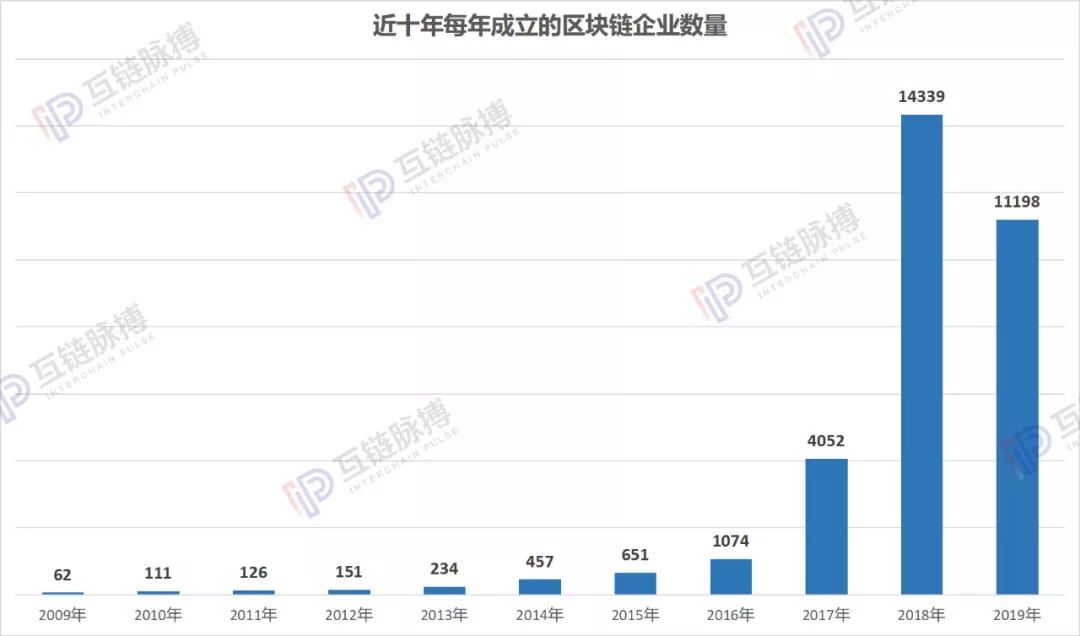
(Mapping: Interlink Pulse Data Source: Enterprise Checkup)
At the same time, the number of blockchain companies established in the whole year of 2019 (11,198) is also lower than the number of blockchain companies established in the whole year of 2018 (14,339), a decrease of 21.9%.
It can be seen that after undergoing the "rapid expansion" in 2018, the development of blockchain companies in 2019 has become calm, which is exactly in line with the Gartner curve. However, or because of the "1024 Conference" boost, the domestic blockchain market has not entered a "bubble trough period", and the number of established blockchain companies in 2019 still remains on the order of tens of thousands.
And if the timeline is extended, compared to a decade ago, the number of blockchain companies established in 2019 has increased by more than 180 times.
In addition, Interchain Pulse is concerned that Guangdong Province will contribute the most to the number of blockchain companies established in 2019. This year, a total of 6,363 blockchain enterprises in Guangdong Province were established, accounting for 56.82% of the total number of establishments. The second echelon is Shandong Province and Zhejiang Province, with 811 and 686 blockchain companies established in 2019, respectively. The third echelon is central China, including Hunan Province, Anhui Province, and Chongqing.
Heat map of the number of blockchain companies established in 2019
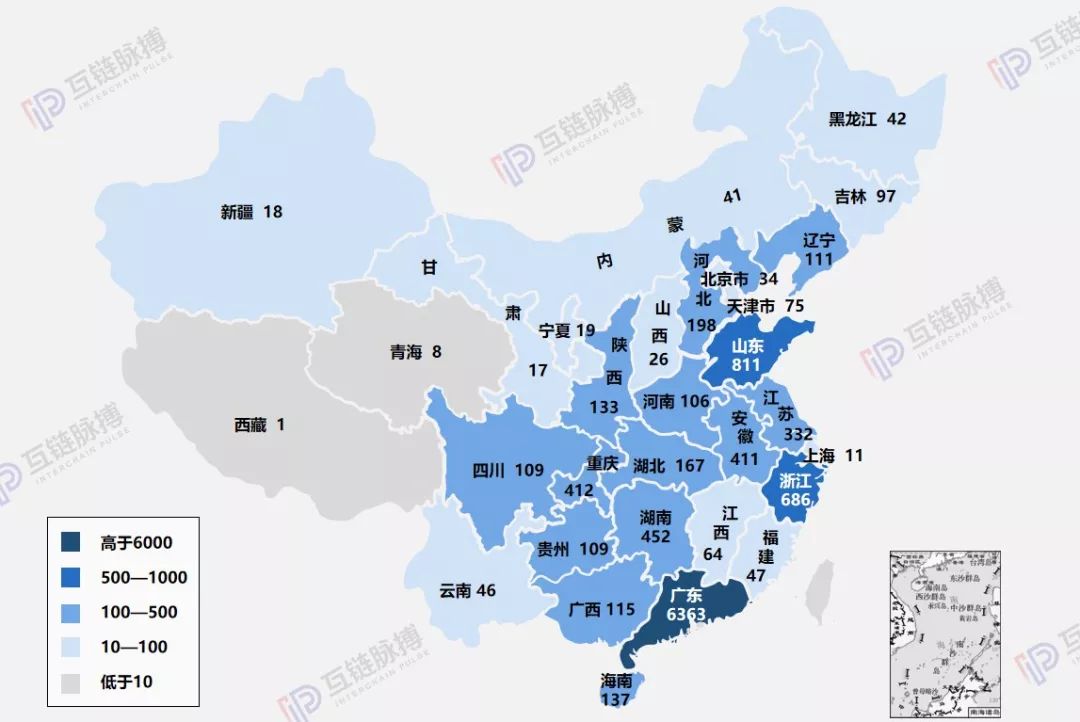
(Mapping: Interlink Pulse Data Source: Enterprise Checkup)
As can be seen from the above figure, domestic blockchain companies have formed three strongholds in Guangdong, Shandong, and Zhejiang, and have shown a trend of diffuse development. The reason why these three regions are clustered is related to local policy conditions and the industrial environment.
Inter-chain pulse statistics, in 2019, Guangdong Province has launched more than 20 blockchain-related policy information. And for the support of the blockchain, Guangdong Province has also formed a "multi-point effort" model. Shenzhen area develops innovative applications such as digital currency research and mobile payment with the support of the CPC Central Committee and the State Council; Huangpu District, Guangzhou City has launched a "blockchain 2.0 2.0" policy; the Financial Services Bureau of Hengqin New District, Zhuhai City has released "Chain + featured finance" white paper; Nanhai District of Foshan City has promoted the construction of a "blockchain +" fintech industry agglomeration base.
And in Shandong Province and Zhejiang Province, more than 10 blockchain-related policy information will be announced in 2019.
While the policy conditions are keeping up, the above three places have all established blockchain industrial parks, forming an industrial agglomeration, which is more likely to attract the establishment and presence of blockchain enterprises. For example, Guangdong has the Guangzhou Blockchain International Innovation Center and Yuexiu International Blockchain Industrial Park; Shandong has the famous Qingdao "Chain Bay"; Zhejiang Province has multiple blockchain industrial parks in Xixi Valley, Xiaoshan District, and Yuhang District.
In addition, the mutual chain pulse statistics have counted the number of blockchain enterprises across the country so far. Guangdong Province still ranks first. At present, there are 20033 blockchain companies, accounting for 61.19% of the total, more than 60%. In the past two years, Zhejiang Province and Shandong Province have ranked the second and third in total. At present, there are 2031 blockchain companies in Zhejiang Province and 1,364 blockchain companies in Shandong Province.
Except for Guangdong, Shandong, and Zhejiang, in the number of blockchain companies in 2019 and the total number of blockchain companies over the years, the top ten regions are: Hainan Province, Hunan Province, Anhui Province, Chongqing City, Jiangsu Province. These five provinces and cities are also areas that focus on the development of the blockchain field, not only with policy support, but also with corresponding industrial coordination.
Among them, Hainan has not only established the Blockchain Industrial Park in Haikou, but also established the Hainan International Offshore Innovation and Pioneering Pilot Zone in Sanya this year, and established the first domestic blockchain laboratory in China. Hunan Province has been actively building a Chinese sample "chain city" for blockchain development under the urging of Loudi City Government.
Blockchain enterprises, mainly small and medium-sized state-owned enterprises, gradually join blockchain technology research
In terms of geographical division, most of the blockchain companies established in 2019 are clustered in Guangdong Province.
From the perspective of enterprise types, the blockchain companies established in 2019 are relatively concentrated in the wholesale and retail industries, with a total of 5,305. Observing the pulse of each other, the blockchain business mainly operated by such companies is the direction of supply chain management, and it also has the development and management of blockchain technology, blockchain technology consulting, new retail plus blockchain plus tokens plus points. And so on.
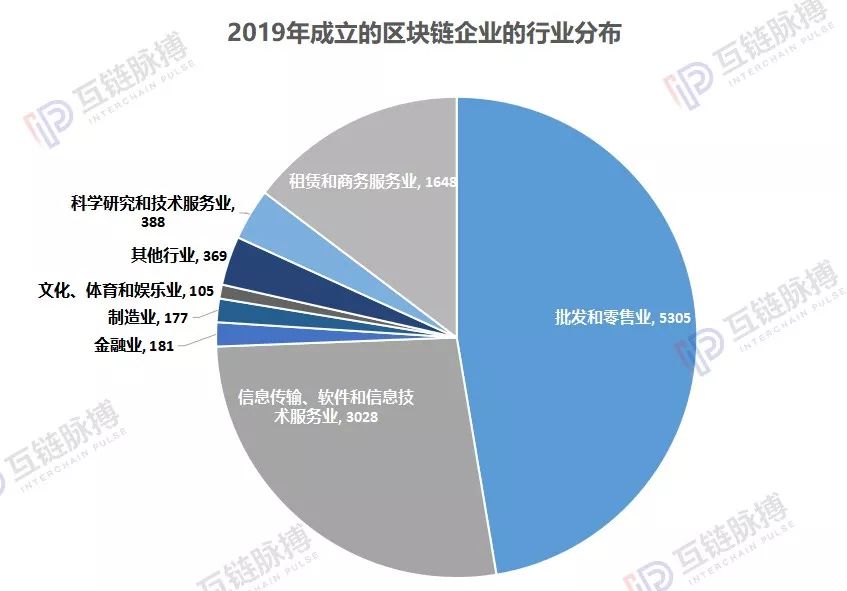
(Mapping: Interlink Pulse Data Source: Enterprise Checkup)
The information transmission, software and information technology service industry ranked second, with a total of 3028 companies; leasing and business services industry has 1,648 companies; scientific research and technology service industry has 388 companies. The fifth field is the financial industry, but the number of blockchain companies belonging to this field is less than expected, with 181. Of these, 73 are financial leasing companies, 22 are investment companies, and 19 are factoring companies.
Although, the blockchain companies established in 2019 are widely distributed in more than 10 industries. However, from the perspective of mutual chain pulse, comprehensively the registered capital of blockchain companies and the number of insured companies, the currently established blockchain companies are still mostly small and medium-sized enterprises.
According to the data retrieved by the enterprise chain, the registered capital of blockchain companies in 2019 is 6,736, accounting for 44.65% of the total number of blockchain companies established in 2019; the registered capital is between 5 and 10 million yuan Among them there were 4369, accounting for 28.96% of the total. That is to say, 70% of the companies have registered capital below 10 million yuan.
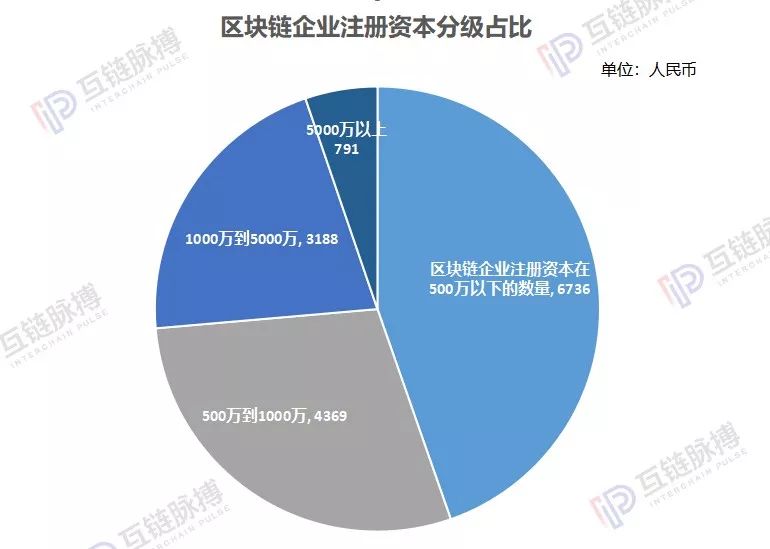
(Mapping: Interlink Pulse Data Source: Enterprise Checkup)
Observe the number of participants in the blockchain industry, and search for companies established in 2019 with "blockchain" as their business scope. The number of participants in all companies is less than 50.
And if you look at all the blockchain companies established over the years, there are 32,622 companies with less than 50 participants, accounting for 99.65% of the total. There are only over 100 companies with between 50 and 499 participants.
And only one of the number of insured is between 500 and 999. It is a financial technology service company under Shenzhen Ping An-Shenzhen One Account Smart Technology Co., Ltd., and Ping An Account is building an infrastructure platform for blockchain applications. ; 1 insured between 1000 and 4999 people, is Guangzhou Pubang Garden Co., Ltd., which is an old-fashioned garden engineering construction and landscape design listed company, and its wholly-owned subsidiary, Beijing Borisix. Overseas wholly-owned subsidiaries have cooperated with the Singapore Topology Foundation in the application of blockchain technology in digital marketing.
Although the two sets of data of the company's registered capital and the number of companies participating in the insurance are not complete representations of the blockchain companies, it can be observed from the side that the currently established blockchain companies are still mainly small and medium-sized enterprises. Large enterprises involved in the blockchain business also rarely focus on the direction of the blockchain.
However, the mutual chain pulse observed that of the 32,736 blockchain companies so far, 11 have been state-owned enterprises that have included blockchain in their business scope. And its number is gradually increasing. There were 1 blockchain-related companies established in 2005 and 2017, 4 established in 2018, and 5 established in 2019. At the same time, the five state-owned enterprises established in 2019, the main business direction of the blockchain is the research and development of blockchain technology.
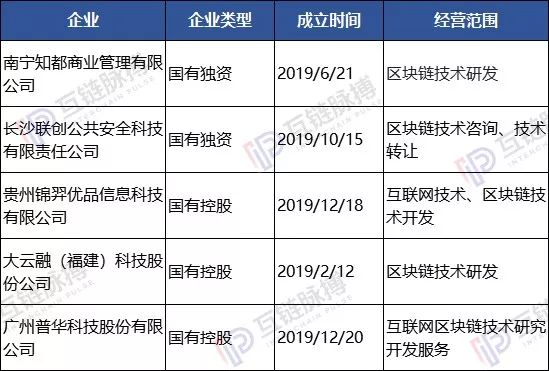
(Tabulation: inter-chain pulse data source: enterprises check)
It can be seen from the above data that state-owned enterprises have gradually joined the blockchain team. In fact, the state-owned enterprises that carry out the blockchain business are far more than these 11 companies. The pulse of each other has been counted. Since this year, there have been as many as 36 state-owned enterprises and 50 blockchain projects have been implemented.
Experiencing the "Blockchain Elimination Tide" in 2018
After analyzing the blockchain companies in 2019 from the dimensions of regions and industries, the mutual chain pulse also paid attention to the different development stages and different development paths of blockchain companies.
Among all the blockchain companies so far, 107 have financing information. Among them, the blockchain companies established in 2018 have the most financing information, with a total of 24; and only 5 of the blockchain companies established in 2019 have financing information.
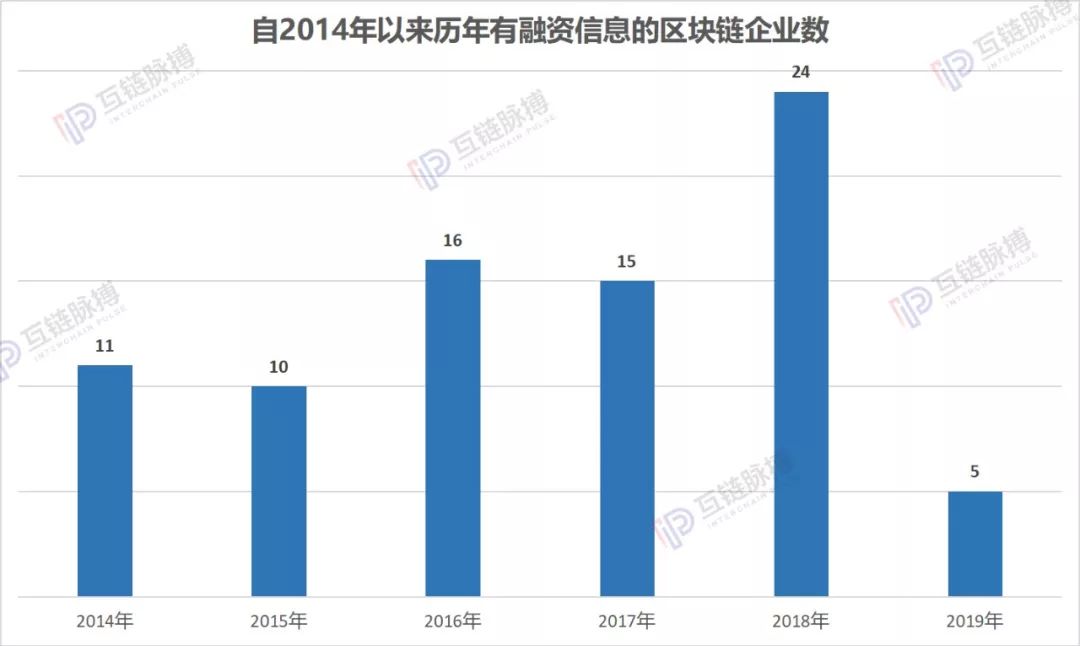
(Mapping: Interlink Pulse Data Source: Enterprise Checkup)
Interchain Pulse StatisticsThe five companies with financing information in 2019 are all companies that are mainly engaged in blockchain business. And several companies are currently in the early stages of financing.
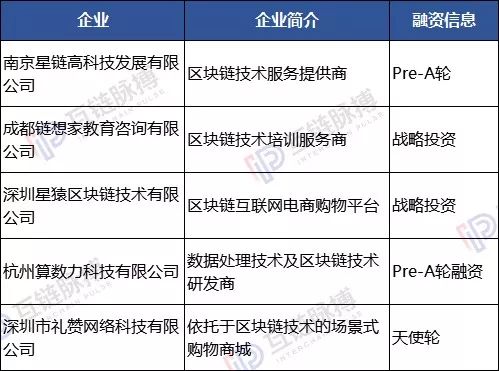
(Tabulation: inter-chain pulse data source: enterprises check)
Since then, Interchain Pulse has focused on companies to look up data. Of the companies that have listed "blockchain" as their business scope, 14 companies have gone public.
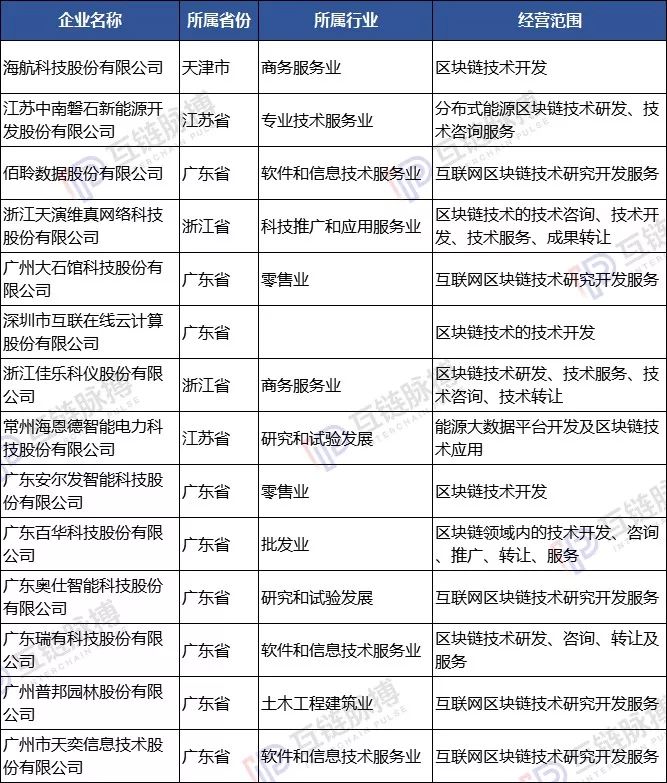
(Tabulation: inter-chain pulse data source: enterprises check)
The interchain pulse has previously counted the information of listed companies in the blockchain, and there should be far more than these 14 listed companies in the development of blockchain. Or because more companies developing blockchains mainly conduct business through subsidiaries, they have not been included in the statistics.
There are blockchain enterprise establishment, financing, and listing. Of course, there are also blockchain enterprises in the state of revocation, revocation, and cancellation. As of now, of the more than 30,000 companies that have put the blockchain into operation, 11 are in the state of revocation; 12 are in the state of revocation; 2671 are in the state of cancellation. The total of the three categories accounts for 8.22% of the total number of blockchain enterprises.
Among the blockchain companies established in 2019, one is in the state of cancellation and 205 are in the state of cancellation, two of which account for 1.83% of the total. Among the blockchain companies established in 2018, 8 were in the state of revocation, 5 were in the state of revocation, and 1740 were in the state of cancellation. The total of the three categories accounted for 12.22 of the number of blockchain enterprises established in the year. %.
In general, the elimination rate of blockchain companies is at a relatively high level, and the "elimination tide" of blockchain companies established in 2018 has appeared. Observing the data in 2019, it seems to have flattened out.
Comprehensive observation from the dimensions of geographical distribution, industry distribution, and company status, compared to the "big ups and downs" in 2018, the development of blockchain companies in 2019 is more calm, and state-owned enterprises have gradually joined.
We will continue to update Blocking; if you have any questions or suggestions, please contact us!
Was this article helpful?
93 out of 132 found this helpful
Related articles
- Babbitt Column | The Biggest Obstacle to Blockchain Application is the Guiding Idea
- In 2020, we are still bullish on blockchain!
- In 2020, the top ten keywords look at crypto assets
- The death knell of the dollar, who is the savior?
- Bitmain launches personnel optimization, streamlines organization, cuts Bitcoin in half
- National Development Institute Li Guangqian: Beware of the "financial restraint" of the blockchain, the physical industry and financial attributes should develop in a balanced manner
- DeFi vs. Apple / Google App Store: Unsolvable battle?





